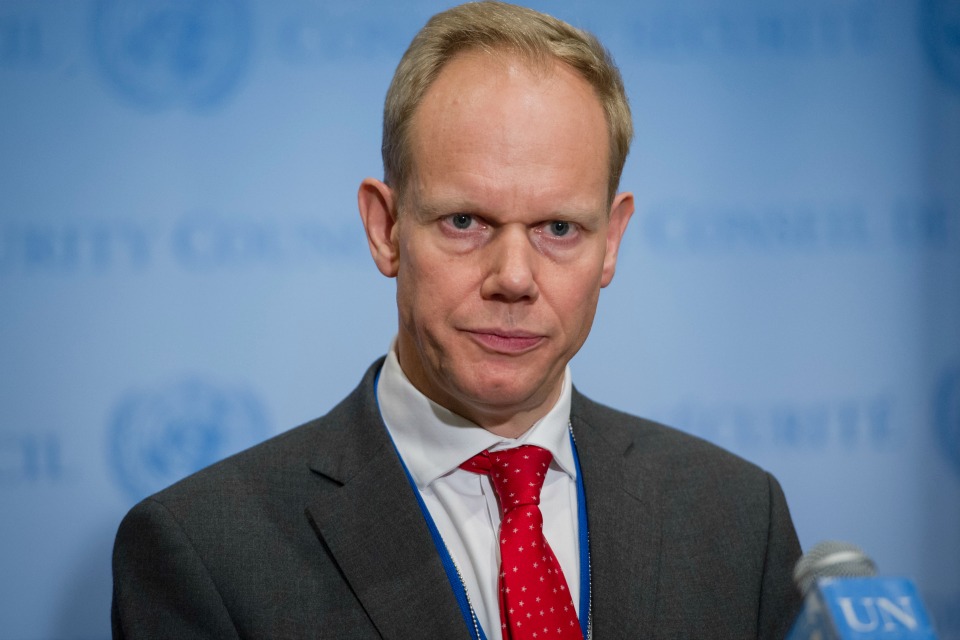"What is most needed is a truly sustainable ceasefire and genuine political will to restore Ukrainian sovereignty."
Statement by Ambassador Matthew Rycroft of the UK Mission to the UN at the Security Council Briefing by the Chairperson of the OSCE

Thank you Foreign Minister Steinmeier for your briefing. We look forward to you returning to the Security Council in your capacity as German Foreign Minister permanently before too long. In the meantime, you have our full support, both in Vienna and here in New York, in taking forward the OSCE priorities this year.
Like the United Nations, the OSCE was founded on the principles of dialogue and respect for peace and stability. So together these two organisations are at the forefront of the rules-based international system.
Sadly, as this Council well knows, this system is seldom left unchallenged, so it is incumbent on both organisations to work closely together to advance peace and security, and in doing so, to uphold the UN Charter and the Helsinki principles.
This strong cooperation is most clearly seen in our response to the continuing crisis in Ukraine. And at the outset, I wish to reaffirm the United Kingdom’s full support for Ukraine’s independence, sovereignty and territorial integrity and our commitment to the return of Crimea to its rightful place as part of Ukraine.
I’d also like to take this opportunity to express the United Kingdom’s gratitude for the leading role played by Germany, and by the German OSCE Chairmanship, in the Normandy group, and in support of the Special Monitoring Mission and theTrilateral Contact Group.
Mr President,
A year on from our last session on the OSCE, can we really say that the overall situation has changed for the better in the east of Ukraine? Our last session focused on the regular breaches of the ceasefire, the use of heavy weapons and the continued presence of convoys crossing the international border. To that list, you can now add the unacceptable aggression towards OSCE monitors. I am saddened and deeply worried to say that, one year on, we seem no closer to a resolution of the crisis.
Since the crisis began over 9,000 people have lost their lives and over 3 million are now in need of humanitarian assistance. It is clear that this toll will only continue to grow unless a truly sustainable ceasefire is put in place and all sides meet their Minsk commitments in full.
To that end, three clear steps must be taken.
First, it is imperative that the monitoring mission, ably directed by Chief Monitor Apakan, is permitted to carry out its mandate in full. The threats and aggressive behaviour towards monitors must end. The mission must have unrestricted access to all of Ukraine, especially those parts of the border with Russia not under Ukraine’s control. The Russian Federation should use its influence on the separatists to ensure this happens without delay – as they are obliged to do.
Second, while there have been some welcome exchanges of prisoners over the last year, at least 134 Ukrainian prisoners remain in detention. We again call on Russia to release all illegally detained Ukrainian citizens, including those held in Russia or in the illegally annexed Crimean peninsula. These include Nadia Savchenko and Oleg Sentsov. We also reiterate that all hostages and illegally detained persons related to the crisis, in and around Ukraine, must be released as stipulated under the Minsk agreements.
Third, even more importantly, what is most needed is a truly sustainable ceasefire and genuine political will to restore Ukrainian sovereignty. The Russian Federation must demonstrate this will and live up to its international commitments.
It must withdraw its weapons and personnel and use its considerable influence over the separatists to bring an end to this crisis and prevent the deaths of more people. This is the best way to end the fear and suffering of ordinary people in eastern Ukraine; and to allow the Ukrainian Government to focus on much needed programmes of governance and reform.
Until these steps are taken, we will be working with our EU partners to ensure that sanctions remain in place. The onus is on Russia to demonstrate a clear commitment to act in line with the principles that guide the OSCE, and this Council and other international organisations.
Finally Mr President, beyond Ukraine, we in the Security Council should not lose sight of the need to work closely with the German OSCE chairmanship to resolve other issues affecting the region. These include protecting fundamental freedoms that continue to come under growing pressure in some OSCE states; addressing the need for greater military transparency; and tackling the protracted conflicts that continue to blight the lives of people across the OSCE region, most notably in Georgia. We need dialogue based on respect for and implementation of commitments. Without that, we face continuing deadlock, which is damaging and debilitating to all sides.
Russian actions in Ukraine cast a shadow over efforts to build confidence and security across OSCE states. We must lift this shadow and, as Foreign Minister Stenmeier said, rebuild trust, renew dialogue and restore security.
Thank you.